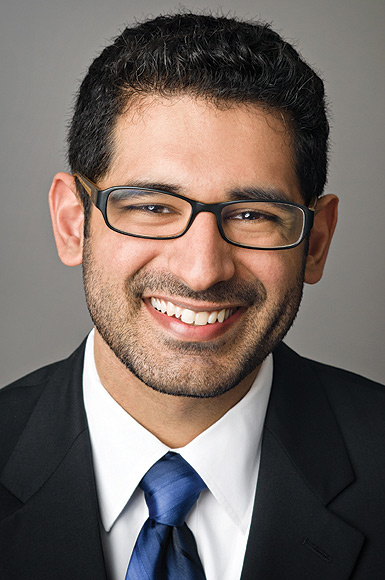 | « Back to article | Print this article |
An Indian American's quest to reclaim his identity
In the second part of a series on Indian Americans who have won the Paul and Daisy Soros Fellowships this year, Arthur J Pais profiles Columbia University graduate Nishant Batsha, who shares his experiences as a second-generation Indian American and how he intends to use the scholarship opportunity.
Part 1: Harvard grad, activist, Soros Fellow: Meet Amar Bakshi
"I'm a New York-based writer of fiction and creative nonfiction," says Nishant Batsha.
"I also live a double life as a doctoral candidate in history at Columbia University."
A Paul and Daisy Soros Fellowship for New Americans will help him travel to Fiji, Trinidad and Guyana to research the persistence of caste identity among South Asian indentured labourers on sugar plantations.
"This area has not received enough attention," says Batsha, who is also working on a novel with the background of mental problems of South Asians in America, which he began to write when he was at Oxford doing his master's in global and imperial history.
Batsha wants to have a career as a historian and write novels, though he is a little tired of telling people he will not write historical novels.
His passion for writing began when he fell severely ill. During and after his convalescence, he began to wonder: What now?
'Daily life's routine was replaced by a frantic desire to escape from a hostile body,' he wrote in his Soros essay. 'Writing was some comfort. I frenetically filled any sheet of paper with notes on the possibilities of what to do when I returned to Columbia from my leave.'
Batsha's parents are from Bihar. On a whim, they moved from India to New York in 1978 and secretly stayed in a male-only single-residence-occupancy hotel on 72nd Street and Broadway.
'They broke the bonds of kith and kin and dreamed that their American children would become doctors or lawyers -- progeny as an escape from the banality of an ossified past,' Nishant wrote in the essay.
He confessed he never meant to break with the expectation of becoming an engineer or a doctor or pursuing a business career -- 'much in the same way my father and mother never meant to have children with American accents. A new passion formed as I found the past to be a place of exploration. Social philosophy, human drama, and compelling narrative were all found in history.'
He served on the Columbia Undergraduate Journal of History's editorial board, and founded and edited the Columbia Undergraduate Journal of South Asian Studies.
He graduated from Columbia magna cum laude and Phi Beta Kappa with a BA in history and in Middle Eastern, South Asian, and African studies.
All the while, Batsha was asking questions about his identity, his future, and about fighting the stereotypes.
'A brief foray into the everyday: My identity as an Indian American is defined through negation,' he writes. 'Everyday questions: Oh, you're Indian? You must be an engineer. You must be upper-middle class. When each question was met with a quiet "no," it became difficult to ignore what did constitute my identity as a South Asian.'
As he grew up in the San Francisco Bay Area, many of his schoolmates were listening to their parents' Bob Dylan collection. He was instead listening to K L Saigal.
'When collective tears were being shed for Leonardo DiCaprio at the end of Titanic,' he wrote in an essay, 'I let loose a few of my own for Renuka Shahane as she fell down the stairs in Hum Aapke Hain Kaun. But I never actively made the language my own. My mother would always talk to me in Hindi and I would respond in English. This suburban Tower of Babel continued until I reached college, where I finally made the effort to learn the language of my youth.'
Now, he is investigating the identities of indentured labour just as he is forging his own identity as a second-generation Indian American.
'The Paul and Daisy Soros Fellowship will help me continue to be situated at the crossroads of two humanistic disciplines,' he said, 'surveying a horizon of what it means to be in the world.'
